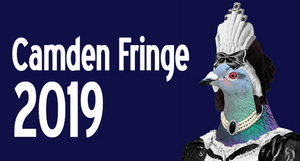Review: MY OTHER SELF at The Cockpit

![]()
All or Nothing Repertory Theatre Company unveils what lies behind King Richard III, William Shakespeare's cruel hunchback, the deformed villain who ends the Bard's War of the Roses Saga. Simon Stewart weaves Henry VI Part 2 & 3 and Richard III into a nifty one-hour play depicting how the King is simply a product of the unhealthy environment that shaped his rise to power.
Directed by Courtney Larkin, My Other Self: The Evolution of Shakespeare's Richard III is an exploration of toxic masculinity and aggressive behaviour in support of CALM (Campaign Against Living Miserably). Stewart's focus starts with Richard as a young boy, made to compete with his siblings in order to gain his father's attention. The scheming, vicious antihero is cut open and the emotional trauma is set free.
The punishment of male weakness (here portrayed with subtle vigour by Joseph Clayton as King Henry VI), fragile masculinity, and the violent climate he's been raised into lead Richard (Alasdair McLaughlin) to display immediate signs of cruelty in his sleaziness. His soliloquies are shattered into a multitude of projections played by the company, who act as voices who haunt him ceaselessly.
The Duke of York his father (Stewart himself) is held as the paragon of virility and male values, with malice and violence almost becoming a coping mechanism for the hated and cursed Richard. This awareness of his birth defects and natural deficiencies fuel his instinctive competitiveness and stoke the fire of the angry ploys to achieve what he wants most.
These intrinsic elements jump out of the text thanks to Stewart's clever use of Shakespeare's original material in an accessible adaptation that, complemented by Larkin's resolute direction, sets the pace for the relentless despotism portrayed. Circular motions and a direct view on the action make My Other Self work exceptionally well in the round.
Most of the time Richard lurks on the events from the sidelines, examining his father's deeds and political maneuvering and building up his character, the proof of how a tyrant is created rather than born. There might be some tonal discrepancies popping up here and there and there's plenty of space for the piece to be expanded and grow but, as it is, it's a remarkably executed and detailed analysis of Shakespearean evil.
Reader Reviews

Videos

